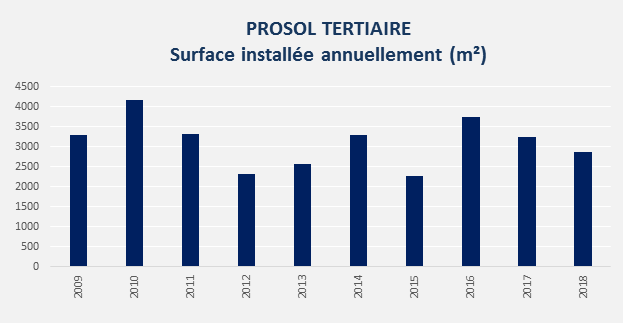Collective Solar Power
Energy for heating (and cooling) represents around 70% of total energy consumption in Tunisia, more than ¾ of the energy consumption of the industrial sector and up to 40% of the energy consumption of buildings. The use of Solar Thermal Energy therefore has significant potential in Tunisia’s various economic sectors.
Tunisia is blessed with an abundance of solar radiation, thanks to its geographical position, with a mean of around 2,000 kWh m‑2 yr‑1. In the country as a whole, areas with the potential for installing Solar Thermal Energy total more than 1,000,000 m2, of which the following have already been identified: 360,000 m2 in the industrial sector, 250,000 m2 in collective habitations (houses, flats, etc.), 170,000 m2 in hotels and 6,000 m2 above covered municipal swimming-pools.
Tertiary PROSOL Program
The solar water heating program in the tertiary sector (PROSOL tertiary) has been launched since 2009 with the support of the Italian cooperation through the UNEP.
Like the PROSOL Residential program, a financing mechanism has been put in place for this program consisting of a premium from the national energy management fund, an additional premium within the framework of international cooperation (until 2016) and the granting of subsidized loans.
As for the achievement, the program has allowed the installation of an average of 3000m² annually against no more than 100 m2/year before 2008.

Advantages and Incentives :
Collective Solar Thermal Plants are subject to different grants, loans and investment assistance. These are allocated by the Fund for Energy Transition (Fonds de Transition Energétique – FTE), which represents the principal mechanism for implementing these initiatives. In addition to the FTE however, there also exists complementary assistance in the form of concessionary loans (subsidized credit lines available to developers) and grants from international co-operative funds.
Through the FTE, businesses that install Collective Solar plants may benefit from a grant of 70% of the costs of Consultants’ and Technical Advisors’ services up to a ceiling of 70,000DT; such businesses may also receive grants of 30% of the cost of investment in materials, up to a ceiling of 250DT m-2 of solar panels as indicated in the table below:

